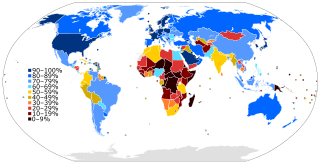The National Science Foundation Network (NSFNET) was a program of coordinated, evolving projects sponsored by the National Science Foundation (NSF) from 1985 to 1995 to promote advanced research and education networking in the United States. The program created several nationwide backbone computer networks in support of these initiatives. Initially created to link researchers to the NSF-funded supercomputing centers, through further public funding and private industry partnerships it developed into a major part of the Internet backbone.

Internet2 is a not-for-profit United States computer networking consortium led by members from the research and education communities, industry, and government. The Internet2 consortium administrative headquarters are located in Ann Arbor, Michigan, with offices in Washington, D.C. and Emeryville, California.
CARNET is the national research and education network of Croatia. It is funded from the government budget and it operates from offices in Zagreb and five other cities.
An institute of technology is a type of university or college that specializes in engineering, technology, applied science, and natural sciences.

The Greek Research and Technology Network or GRNET is the national research and education network of Greece. GRNET S.A. provides Internet connectivity, high-quality e-Infrastructures and advanced services to the Greek Educational, Academic and Research community, aiming at minimizing the digital divide and at ensuring equal participation of its members in the global Society of Knowledge. Additionally, GRNET develops digital applications that ensure resource optimization for the Greek State, modernize public functional structures and procedures, and introduce new models of cooperation between public bodies, research and education communities, citizens and businesses. GRnet's executives have been contributors of or occupied board positions in organisations including GÉANT, TERENA, DANTE,GR-IX, Euro-IX,, RIPE NCC. GRNET provides advanced services to the following sectors: Education, Research, Health, Culture. GRNET supports all Universities, Technological Education Institutes, Research Centers and over 9,500 schools via the Greek School Network a population of more than one million people. Video presentations of some of the services are available in Pyxida.
The China Education and Research Network is the first nationwide education and research computer network in China. The CERNET project is funded by the Chinese government and directly managed by the Chinese Ministry of Education. It is constructed and operated by Tsinghua University and the other leading Chinese universities.

Asia Pacific College (APC) was established in 1991 as a non-profit joint venture between IBM Philippines and the SM Foundation. It was envisioned as a learning institution that produces graduates who fulfill information technology industry demands.
The Corporation for Education Network Initiatives in California is a nonprofit corporation formed in 1997 to provide high-performance, high-bandwidth networking services to California universities and research institutions. Through this corporation, representatives from all of California's K-20 public education combine their networking resources toward the operation, deployment, and maintenance of the California Research and Education Network, or CalREN. Today, CalREN operates over 8,000 miles of fiber optic cable and serves more than 20 million users.

The De La Salle Medical and Health Sciences Institute (DLSMHSI) is the member school of De La Salle Philippines that focuses on medical and allied health education, health care provision, and research. The institution consists of three distinct divisions: the university, its teaching hospital, and a research center.

CESNET is developer and operator of national e-infrastructure for science, research, development and education in Czech Republic. The CESNET association was founded in 1996 by Czech public universities and the Academy of Sciences of the Czech Republic. An important part of CESNET's activities is research of advanced network technologies and applications from hybrid networking, programmable hardware, metacomputing to middleware and video transmissions. CESNET fulfils the role of NREN within the Czech Republic and represents it in international organisations such as the GÉANT Association, EGI and GLIF. CESNET is involved in the implementation of the European backbone network project called GÉANT. Within the Czech Republic CESNET fulfils the role of a coordinator of large infrastructures involved in the field of information technology.
The China Next Generation Internet (CNGI) project is a five-year plan initiated by the Chinese government with the purpose of gaining a significant position in the future development of the Internet through the early adoption of IPv6.
The University of the East College of Computer Studies and Systems pioneered in the offering of a baccalaureate degree in Computer Science in the University Belt area starting 1988. Presently the Commission on Higher Education (CHED) has identified the University of the East as a Center of Excellence in Information Technology Education.
CAP College Foundation is a private, non-sectarian, distance learning college in the Philippines.

STI College, formerly known as Systems Technology Institute, is the largest network of for-profit information technology based colleges in the Philippines. This private college system offers a curriculum including accountancy and business administration, and computer science. The acronym STI has been declared as an orphan initialism after their name change in 2006.

Internet in the Philippines first became available on March 29, 1994, with the Philippine Network Foundation (PHNet) connecting the country and its people to Sprint in the United States via a 64 kbit/s link. As of 2016, more than 44,000,000 people used the internet in the country, accounting for 43.5% of the total population.

Zamboanga State College of Marine Sciences and Technology (ZSCMST) is a state college in Zamboanga City, Philippines. It is the only school in Western Mindanao that offers courses in marine studies and fisheries. It is located at the heart of Zamboanga City, alongside Fort Pilar Shrine.
The Catanduanes State University is a public university in the Philippines mandated to provide higher professional and technical instruction and training in business education and commerce; and for special purposes, to promote research, advance studies, and progressive leadership in the field of education, business education and commerce.
The higher education in the Philippines is offered through various degree programs by a wide selection of colleges and universities—also known as higher education institutions (HEIs). These are administered and regulated by the Commission on Higher Education (CHED).
Korea Internet Neutral Exchange, the only carrier-neutral Internet exchange (IX) in South Korea, is a B2B company that specializes in Internet infrastructure. KINX provides Internet data center (IDC), Content Delivery Network (CDN), and Cloud computing services to customers. The headquarters is in Seoul, South Korea. As of June 2019, KINX has 116 employees.

The Réseau d'informations scientifiques du Québec is the optical research and education network in the province of Quebec, Canada. The Risq is a non-profit cooperative established in 1989 by leaders from Quebec's universities, RISQ originally connected those universities to the U.S. government's NSFNET using leased telephone connections. It manages the education and research network in the Province of Quebec. This organisation offers telecommunication services to the Provincial universities and the Colleges of further education (CEGEP), the school boards, research institutes, university hospitals, government departments, agencies, cultural and service organizations.The RISQ acts as a place of information, coordination and expertise.









